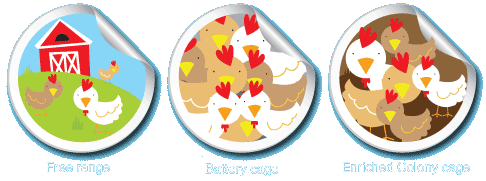
The Value Egg Producer, Packer and Enriched Colony Specialist

Production methods
The different ways hens are kept to lay your tasty eggs...

FAQ's
We've been asked all kinds of questions about Hens, we decided to share the answers, and will continue to add to this section.
Q. How old are chickens before they start to lay?
A. When the hens are around seventeen weeks of age they are referred to as "point of lay" and begin to lay eggs in the weeks soon after.
Q. How long do they lay for?
A. Once laying the hen will continue for over a year. Here in the UK our producers usually depopulate our flocks at around 72 weeks of age.
Q. What sort of breeds of chickens are used for egg production?
A. Modern egg production has seen the development of hens ideally suited for the production of eggs, we use a number of different types of birds and different ones for the production of chickens meat.
Q. How many eggs does a chicken lay?
A. With high welfare and good production, a hen can lay up to an egg a day.
Q. What happens to hens when they stop laying eggs?
A. This is the end of the laying cycle and our units are 'depopulated'. The hens are moved out from the units and then sent for processing for certain types of food production. Although different from the chickens used for table meat the end of lay hen is still valued for its type of chicken meat.
Q. Do brown hens lay white eggs?
A. No, generally brown hens lay brown eggs, however some free range units now use a breed of white hen that can lay a brown egg! (just to make matters a little more complicated).
Phosphates
Phosphates are an important issue in Farming - Here's why...
Farmers need to fertilise their crops, and it's really efficient to use animal waste from your own farm as fertilizer. But, the level of phosphate allowed into the soil is regulated, and varies geographically. Over 10 million tonnes of organic material is spread on the land in the UK. More than 90 percent of this is animal manure. The remainder is treated sewage sludge, paper sludge, green waster compost and organic industrial wastes. The rules governing this are set to protect the health of people and the environment.
Farmers play a vital role in re-using resources such as animal manure and biodegradable wastes on land. These provide valuable nutrients to the soil, add organic material and help maintain soil structure.